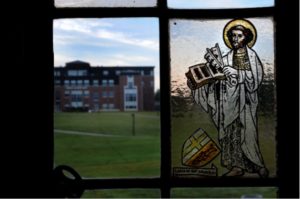Worth Revisiting Wednesday! This post originally appeared on May 4, 2014.
The belief that faith and reason are complementary ways of coming to know the truth, rather than antagonistic rivals or competitors for one’s allegiance, has its foundation in the NT itself and, ultimately, in a person rather than a text.
When the earliest of Christian writers were searching for ways in which to articulate the meaning of what we might call the “Jesus Event,” i.e., the life, death and resurrection of Jesus of Nazareth, one of the first associations they made was between Jesus and the ‘wisdom’ [σοφία] or ‘reason’ [λόγος] of God. Drawing from the book of Wisdom, St. Paul refers to Christ as “the wisdom [σοφίαν] of God” (1 Cor 1:24). “All things were created through him and for him,” the Apostle states elsewhere, “He is before all things, and in him all things hold together” (Col 1:16-17).
These latter remarks about Jesus, the identification of him with God’s divine wisdom, NT scholars agree pre-date St. Paul himself. They were, most likely, part of a hymn to Christ which the early Christian community used in their liturgical services. Thus, from the very beginning of Christianity, before the composition of the NT, Christians understood Jesus as the incarnation, the en-fleshment, of God’s divine wisdom; the wisdom by which God created, governs and sustains the natural world. The living embodiment of the ‘plan’ (ratio) according to which the cosmos was designed and functions.
A bit later in Christian history, around the year 90, this belief was given its classic expression in the prologue to St. John’s Gospel: “In the beginning was the Word [λόγος], and the Word was with God, and the Word was God. He was in the beginning with God. All things came to be through him, and without him nothing came to be” (Jn 1:1-3).
The Greek term for ‘Word’ [λόγος] in this translation can have many meanings: word, speech, language, an account or narrative, or an explanation. It can also mean, most importantly, ‘reason’ or ‘thought.’ So if we exchange translations, we can read the same passage as: “In the beginning was Reason and Reason was with God, and Reason was God. He was in the beginning with God. All things came to be through him, and without him nothing came to be.” With his obvious linguistic allusion to Genesis 1:1 [i.e., “In the beginning…”], the author of the prologue is affirming the divine nature of God’s reason and wisdom. A few verses later, of course, the author takes the further step of associating this Reason with the person of Jesus: “And the Word [Reason] became flesh and made his dwelling among us” (Jn 1:14).
For the Catholic, then, as true now as was for these early Christian authors, it is in God, and especially through the person of His Son Jesus Christ, that Wisdom, Reason and Truth have their being. As Jesus said: “I am the way the truth and the life” (Jn 14:6) and “for this I was born and for this I came into the world, to testify to the truth. Everyone who belongs to the truth hears my voice” (Jn 18:37).
Understanding that the world was created according to divine reason, and that the seeds of reason are to be found in the entire created order, the Catholic tradition has long affirmed the human capacity, and supported the human effort, to discover truth in the natural world by the light of human reason. It is true that the early Christian theologian Tertullian famously asked the question: “What has Athens to do with Jerusalem?” (De praescr. haeret. 7). But on that matter, and quite a few others, Tertullian was departing from the established Christian thought of his time. The Catholic tradition, on the other hand, acknowledges that since truth cannot be opposed to itself, the truths of the faith cannot contradict those of science or reason (cf. Aquinas SCG 1.7). Faith and reason are not competitors, but the two complementary ways in which humankind might come to know the truth.
This point has been articulated throughout the Catholic intellectual tradition and, more recently, the Second Vatican Council stated that “methodical research, in all realms of knowledge, if it respects […] moral norms, will never be genuinely opposed to faith: the reality of the world and of faith have their origin in the same God” (GS § 36). Likewise, Pope St. John Paul II stated that faith and reason are two complimentary ways of coming to the truth because “the unity of truth is a fundamental premise of human reasoning, as the principle of non-contradiction makes clear” (FR § 34).
The mutual necessity of both faith and reason is nowhere more evident than in the discipline of theology. In examining the application of reason to matters of faith, St. Augustine once wrote: intellege ut credas, crede ut intellegas (‘to understand so that you might believe, to believe so that you might understand’) (s. 43.9). More than half a millennium later, the Benedictine archbishop of Canterbury, St. Anselm, meditating on St. Augustine’s thought, would famously define theology as fides quaerens intellectum (‘faith seeking understanding’) (Cf. Pros. 1-2).
In attempting to sum up this intellectual inheritance, this particularly Catholic way of viewing, inter alia, the relationship between faith and reason, many writers have taken to calling this hermeneutic
the Catholic “both/and.” As opposed to looking at the world and seeing a multitude of choices which demand an “either/or” decision, the Catholic “both/and,” being sensitive to false dichotomies, sees the value – and in many instances the necessity – of each choice: nature and grace, action and contemplation, freewill and providence, invisible grace and material signs, and, of course, faith and reason. From the Catholic perspective, therefore, the relationship between faith and reason has never been an antagonistic one. Rather, the Catholic sees the proper use of one’s intellect as an activity which draws us nearer to God by seeking His Wisdom.
Anthony Coleman teaches theology for Saint Joseph’s College Online.


